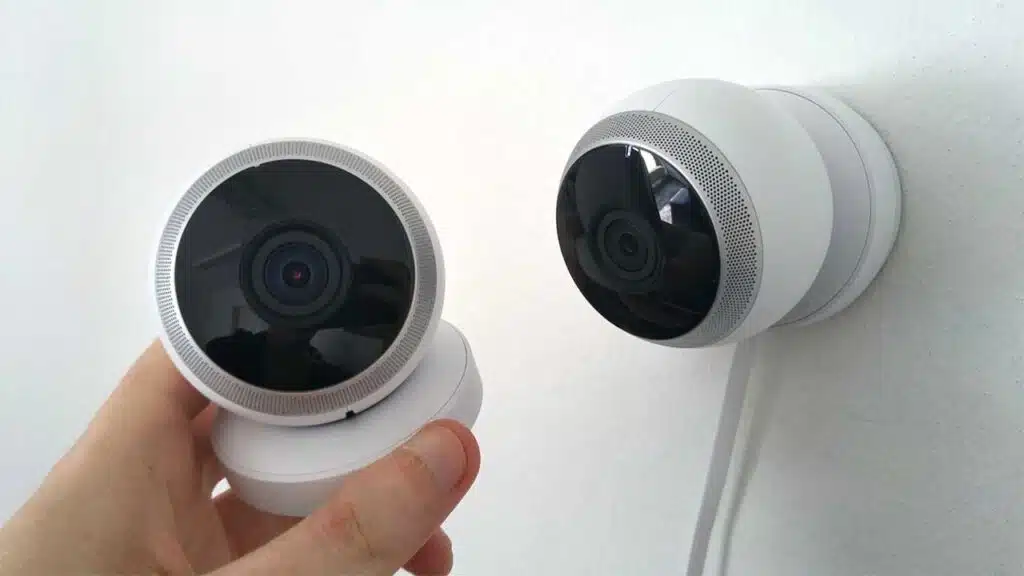Smart devices make our lives easier, but they also collect a lot of information about us. From smartphones to smart TVs, many gadgets in our homes track our habits and movements.
This data can be used for things like targeted ads or product recommendations. You can take steps to protect your privacy and limit how much these devices track you.
Some smart devices listen to your conversations or record your location. Others might monitor your internet browsing or shopping habits.
It’s important to know which of your devices are collecting data and how to control it. By adjusting settings and being aware of what you share, you can enjoy the benefits of smart technology while keeping more of your information private.
1. Amazon Echo
The Amazon Echo is a popular smart speaker that can do many helpful things. It plays music, answers questions, and controls other devices in your home. But it’s also always listening for its wake word, usually “Alexa.”
This means the Echo is constantly recording audio in your home. It sends small clips to Amazon’s servers when it hears the wake word. You can view and delete these recordings in the Alexa app.
To stop the Echo from listening, you can turn off its microphone. Look for the microphone button on top of the device and press it. A red light will show the mic is off. Just remember to turn it back on when you want to use voice commands again.
You can also change privacy settings in the Alexa app. Go to Settings > Alexa Privacy to control things like voice recordings and data usage. You can delete your voice history or set recordings to delete automatically.
For extra privacy, unplug the Echo when you’re not using it. This completely stops any listening or data collection. Just plug it back in when you want to use it again.
2. Google Nest Hub
The Google Nest Hub is a smart display that can track more than you might think. It’s a central control for your smart home devices.
This hub monitors how you use connected gadgets. It keeps tabs on when you’re home and when you’re not. Some models even track your sleep patterns.
The Nest Hub listens for voice commands. This means it’s always ready to hear what you say. It can learn your daily routines and preferences over time.
You can limit what the Nest Hub tracks. Go to your Google account settings and adjust your privacy options. Turn off features you don’t want, like voice recording or activity tracking.
Consider unplugging the device when you’re not using it. This stops it from collecting data. You can also mute the microphone with the physical switch on the device.
Remember, the Nest Hub is designed to make your life easier. But it’s up to you to decide how much information you’re comfortable sharing.
3. Apple iPhone
Your iPhone is a powerful device that can track your location and activities. It has built-in GPS and other sensors that collect data about where you go and what you do.
Apps on your iPhone can access this information if you give them permission. Many apps request location access, even when it’s not needed for their main functions.
You can control what data your iPhone collects. Go to Settings > Privacy > Location Services to see which apps have location access. Turn off access for apps that don’t need it.
For more privacy, you can also limit ad tracking. Go to Settings > Privacy > Tracking and turn off “Allow Apps to Request to Track.”
Check your iPhone’s privacy settings regularly. Apple often adds new controls to give you more options. You can decide what information to share and what to keep private.
Remember, your iPhone tracks data to provide useful services. But you have the power to choose how much you want to share. Take control of your privacy settings to use your iPhone on your own terms.
4. Samsung Smart TV
Samsung Smart TVs collect data on your viewing habits. They track what you watch and when you watch it. This info helps them suggest content and target ads.
You can limit this tracking. Go to your TV’s settings menu. Look for “Terms & Policies” under the Support section. There, you’ll find options to control data collection.
Turn off “Viewing Information Services” to stop ACR. This prevents the TV from analyzing what you’re watching. You can also opt out of personalized ads in this menu.
For more privacy, disable the TV’s internet connection. This stops it from sending data back to Samsung. But it also means you lose smart features.
Check your TV’s privacy settings regularly. Samsung may update them with software updates. Stay on top of what data your TV collects and how it’s used.
5. Ring Video Doorbell
Ring video doorbells are popular smart home devices that let you see who’s at your door. They have cameras and can send alerts to your phone. But these handy gadgets may also be tracking you in ways you didn’t expect.
Your Ring doorbell records video of everyone who comes to your door. It can also pick up audio nearby. This means it might capture your conversations or activities outside your home.
Ring doorbells connect to the internet. This allows you to check the camera from your phone. But it also means others could potentially access the video feed if your account is hacked.
Some Ring models have motion sensors. These can track movement near your home even when no one rings the bell. This creates a record of comings and goings around your property.
To protect your privacy, adjust your Ring’s settings. Turn off features you don’t need. Use a strong password for your account. You can also limit how long videos are stored.
Consider putting up signs to let visitors know they’re being recorded. This helps protect their privacy too. You can also turn off the camera when you’re home if you want more privacy.
6. Fitbit Charge
The Fitbit Charge is a popular fitness tracker that can collect a lot of data about you. It tracks your steps, heart rate, sleep patterns, and more.
This device uses Bluetooth to sync with your phone. It sends your health data to the Fitbit app. From there, it can be shared with other apps or services.
You might not realize how much info your Fitbit Charge gathers. It knows when you’re active and when you’re resting. It can even tell if you’re stressed based on your heart rate.
To limit tracking, you can change your privacy settings in the Fitbit app. Go to the settings menu and look for privacy options. You can choose what data to share and what to keep private.
You can also turn off Bluetooth on your phone when you’re not syncing. This stops the constant data transfer between your Fitbit and phone.
Remember to review Fitbit’s privacy policy. It explains how they use your data. You can opt out of some data sharing if you want more privacy.
If you’re really concerned, you can use your Fitbit without syncing to the app. But this limits its features and usefulness.
Lastly, make sure to update your Fitbit Charge regularly. Updates often include security fixes that protect your data better.
7. Nest Thermostat
Nest thermostats are smart devices that control your home’s temperature. They learn your habits and adjust settings automatically. But this means they’re also gathering data about you.
These devices track when you’re home and away. They know your temperature preferences and daily routines. This information helps them save energy, but it also reveals a lot about your life.
You can limit what Nest knows about you. Go to your device settings and look for options like “Home/Away Assist” or “Auto-Schedule.” Turn these off if you don’t want Nest to track your movements or habits.
You can also stop Nest from sharing your data. Check the privacy settings in your Nest account. Look for options to opt out of data sharing with Google or third parties.
Remember to review these settings regularly. Nest may update its features or policies, changing what data it collects. Stay informed to keep your privacy in check.
If you’re really concerned, consider switching to a non-smart thermostat. This gives you full control over your heating and cooling without any data collection.
8. Tile Mate
The Tile Mate is a small tracking device you can attach to your belongings. It helps you find lost items using Bluetooth and a smartphone app.
Tile Mate works by connecting to your phone. When an item is lost, you can use the app to make the Tile ring. This helps you locate the item if it’s nearby.
If your item is far away, Tile uses its network of users to help find it. When another Tile user passes by your lost item, you’ll get an alert with its location.
Tile Mate has some privacy concerns. It could potentially be used to track someone without their knowledge. To protect yourself, be aware of any unfamiliar objects attached to your belongings.
You can also use the Tile app to detect unwanted Tiles near you. The app will alert you if an unknown Tile is traveling with you for a while.
To stop Tile tracking, you can turn off Bluetooth on your phone. This prevents Tiles from connecting to your device. You can also remove the battery from a Tile if you find one on your items.
9. Roomba i7+
The Roomba i7+ is a smart vacuum that can clean your home on its own. It’s made by iRobot and has some cool features. But did you know it’s also tracking info about your home?
This robot vacuum maps your house as it cleans. It remembers where your furniture is and which rooms are which. The i7+ can store up to 10 different floor plans.
Your Roomba collects data on how often you clean and when. It knows the size of your home and how dirty each area gets. All this info is sent back to iRobot through your Wi-Fi.
You might wonder why this matters. Well, iRobot could use or sell this data. Companies could learn a lot about your habits and home layout.
Want to stop the tracking? You can turn off the smart mapping feature. This means the Roomba won’t remember your home’s layout. You can also disconnect it from Wi-Fi when not in use.
Think about whether the convenience is worth the privacy trade-off. The i7+ is a great cleaner, but it’s also a data collector. It’s up to you to decide what you’re comfortable with.
10. Smart Refrigerators
Smart refrigerators are more than just cool appliances. They can track your food habits and daily routines. These high-tech fridges often have cameras inside. They see what you buy and eat.
Some smart fridges connect to apps on your phone. This lets you check what’s inside from anywhere. But it also means the fridge knows when you open it and what you take out.
Many smart refrigerators can make shopping lists for you. This is handy, but it creates a record of your food preferences. Some models even order groceries automatically.
To protect your privacy, turn off features you don’t need. Disable cameras if possible. Don’t connect the fridge to Wi-Fi if you’re worried about data sharing.
Read the privacy policy before buying a smart fridge. See what data it collects and how it’s used. Choose a model with strong security features to keep your info safe.
You can still enjoy the benefits of a smart fridge while limiting tracking. Use only the features you really need. This way, you control what information you share.
Risks of Smart Device Surveillance
Smart devices can track your activities and gather personal data. This can lead to privacy issues and security risks if not managed carefully.
Privacy Concerns
Smart TVs, cameras, and fitness trackers collect a lot of info about you. TVs can track what you watch and when. Security cameras record video and audio in your home. Fitness trackers know where you go and details about your health.
This data paints a detailed picture of your life. Companies may use it to target ads or sell to others. Hackers could steal it to learn your habits or when you’re not home.
To protect yourself, turn off features like “Viewing Data” in TV settings. Don’t agree to data collection when setting up new devices. For cameras, be careful where you place them and check their privacy settings.
Data Security Risks
Smart devices often store your data online. This can be risky if not properly secured. Weak passwords or outdated software make it easier for hackers to get in.
If breached, your personal info could be exposed. This might include:
- Home address
- Daily routines
- Health data
- Financial details
To stay safe, use strong, unique passwords for each device. Keep software up to date. Turn off features you don’t need. Be cautious about what data you allow devices to collect and store.
Consider if you really need “smart” versions of devices. Sometimes, simpler tech with fewer tracking features can be safer.
Understanding How Smart Devices Track You?
Smart devices collect a lot of data about you and your habits. They use different methods to gather information and can track many aspects of your daily life.
Data Collection Methods
Smart devices use many ways to collect data. GPS tracks your location. Bluetooth connects to nearby devices. Wi-Fi monitors your internet use. Microphones listen to your voice. Cameras watch your movements.
Some gadgets have sensors that measure things like temperature or motion. Others connect to your phone or computer to get more info. Many devices send data to the cloud for storage and analysis.
Types of Data Collected
Smart devices gather a wide range of data. They track:
- Your location and travel patterns
- Websites you visit and apps you use
- Voice commands and conversations
- Photos and videos you take
- Heart rate, sleep, and exercise habits
- Energy use and home temperature settings
- Shopping habits and purchase history
This data helps companies learn about you. They use it to show ads, improve products, and predict what you might do next. Some info can be helpful, but it also raises privacy concerns.
Mitigating Smart Device Tracking
You can take steps to protect your privacy from smart devices. These devices often collect data, but you have options to limit tracking and safeguard your information.
Adjusting Privacy Settings
Check your device settings regularly. Look for options to turn off location tracking, data collection, or personalized ads. On smartphones, go to the privacy menu to control which apps can access your data. For smart home devices, use the companion app to adjust privacy preferences.
Smart TVs often have settings to disable automatic content recognition. Gaming consoles let you choose what data to share. Even your car may have privacy controls in its infotainment system. Take time to review these settings on all your devices.
Don’t forget about social media and online accounts. Set profiles to private and limit data sharing with third parties. Small changes can make a big difference in protecting your information.
Using Privacy Tools
Special tools can boost your privacy defenses. Virtual Private Networks (VPNs) hide your internet activity from trackers. Ad blockers stop companies from following you across websites.
Password managers help you create strong, unique passwords for each account. This makes it harder for hackers to access your data. Two-factor authentication adds an extra layer of security.
For smart home devices, consider using a separate Wi-Fi network. This keeps them isolated from your main network. You can also use smart plugs to easily turn off devices when not in use.
Privacy-focused web browsers and search engines minimize data collection as you surf the web. These tools work together to shield your digital life from prying eyes.
Final Thoughts
As we continue to embrace the convenience and innovation of smart devices, it’s crucial to remain vigilant about our privacy.
While these gadgets can make our lives easier and more connected, they also collect vast amounts of data that can be used in ways we may not fully understand or control.
By taking proactive steps—such as adjusting privacy settings, using privacy-enhancing tools, and being mindful of what information we share—we can enjoy the benefits of smart technology without compromising our personal privacy.
Remember, in the digital age, protecting your privacy is an ongoing effort that requires awareness and action. Stay informed, stay secure, and take control of your digital footprint to ensure your data remains yours.








































